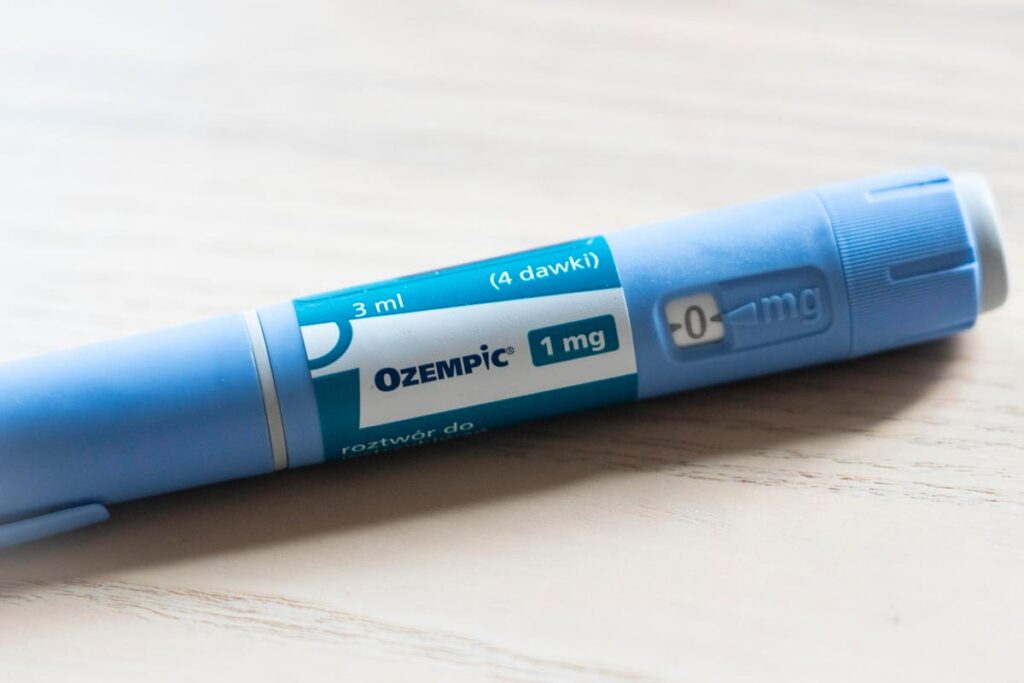Topline
Popular weight loss drugs like Ozempic, Wegovy, Saxenda and Rybelsus can lead to an increased risk of serious stomach problems like gastroparesis and bowel obstruction compared to other weight loss drugs, according to a study published Thursday in JAMA—though researchers said the risk remains fairly low.
An Ozempic (semaglutide) injection pen is seen on a kitchen table.
Key Facts
Previous studies have found a link between diabetics who take these medications and an increased risk of gastrointestinal adverse events, but this is the first study to examine the risks of people taking the drugs—known as GLP-1 agonists—strictly for weight loss.
The study included 613 patients taking semaglutide (sold under the names Wegovy, Ozempic and Rybelsus) and 4,144 taking another GLP-1 called liraglutide (also known as Saxenda), and compared them to 654 patients on bupropion-naltrexone—another popular weight loss medication that’s not a GLP-1 drug and is sold under the brand name Contrave.
Compared to patients on bupropion-naltrexone, patients taking the two GLP-1 agonists had a 9.09 times greater risk of pancreatitis, 4.22 times greater risk of bowel obstruction and a 3.67 times greater risk of gastroparesis, or stomach paralysis.
Overall, 11 of the patients on semaglutide and 372 patients on liraglutide faced gastrointestinal problems, compared to 22 patients on bupropion-naltrexone, the study found.
Though incidences of two specific health issues—gastroparesis and pancreatitis—were higher in patients on semaglutide than those on the drug bupropion-naltrexone, incidences were lower for bowel obstruction in semaglutide patients.
Researchers also found a higher incidence rate of biliary disease, which affects the gallbladder, though the difference wasn’t statistically significant.
Although these problems are rare, researchers recommend drugmakers update their labels, which don’t currently address the possibility of gastroparesis, to reflect the risk because this is “critical information for patients to know.”
Crucial Quote
“The risk calculus will differ depending on whether a patient is using these drugs for diabetes, obesity or just general weight loss,” first author Mohit Sodhi, a researcher at the University of British Columbia, said in a statement. “People who are otherwise healthy may be less willing to accept these potentially serious adverse events.”
Key Background
Drugs like Ozempic and Wegovy have become increasingly common to treat weight loss. However, there has been anecdotal evidence that GLP-1 agonists cause gastroparesis. A lawsuit was filed against Novo Nordisk, the manufacturer of Ozempic, Wegovy and Rybelsus, and Eli Lilly, the maker of Mounjaro, claiming the medicines cause gastroparesis. The suit also claims the makers knew of the risk between GLP-1 agonists and severe gastrointestinal issues but failed to disclose it to their consumers. The American Society of Anesthesiologists (ASA) warned patients in June about the risks GLP-1 agonists posed to anesthesia and asked them to stop taking the drugs at least a week before elective surgeries due to an increased risk of vomiting during operation. The ASA has received reports that an “increased risk of regurgitation and aspiration of food into the airways and lungs during general anesthesia and deep sedation” was potentially being caused by the drugs’ ability to “delay” stomach emptying. CNN put out a report in July detailing the experiences of patients who reportedly suffered from gastroparesis as a result of Ozempic and Wegovy. The patients noticed they were vomiting days-old food and some doctors said it wasn’t unusual for people taking Ozempic to have stomachs full of food when doing an endoscopy. The report even detailed the experience of one patient who had to have a stomach bypass surgery to help relieve their gastroparesis.
Contra
Novo Nordisk told Forbes its drugs label “symptoms of delayed gastric emptying, nausea and vomiting are listed as side effects,” and “patient safety is of utmost importance” to the company. Eli Lilly has said: “Patient safety is Lilly’s top priority, and we actively engage in monitoring, evaluating and reporting safety information for all our medicines.” In August, weight loss expert Steven Batash told Forbes it’s “not really an accurate statement” to say drugs like Ozempic cause gastroparesis.
Tangent
Gastroparesis slows down or stops the movement of food from the stomach to the small intestine even though there’s not a blockage, which prevents the stomach from properly emptying. Although the type and amount of food consumed can affect this, it usually takes around six to eight hours for food to pass from the stomach to the small intestine. Gastroparesis extends the digestion by different times depending on the person. Some symptoms include too much bloating, feeling full after starting a meal, feeling full long after finishing a meal, vomiting, heartburn, pain in the upper abdomen, poor appetite and excess burping. Bowel obstruction—also known as intestinal blockage—occurs when something blocks either the small or large intestine. This hinders a person’s ability to have a bowel movement or pass gas. Symptoms include constipation, lack of appetite, nausea or vomiting, inability to pass gas, diarrhea with partial blockage or a hard, swollen belly. Pancreatitis is the inflammation of the pancreas caused by the digestive juices or enzymes attacking the pancreas. Symptoms look like a fever, rapid heart rate, nausea or vomiting, severe stomach pain, lowered blood pressure, fluid buildup in the stomach, yellowing of the skin or eyes and tenderness or swelling of the stomach.
Further Reading
What To Know About Gastroparesis: Lawsuit Claims Ozempic And Mounjaro Causes The Severe Stomach Disorder (Forbes)
Walmart Exec Reportedly Says Ozempic Could Be Impacting Food Sales: ‘Slight Pullback In Overall Basket’ (Forbes)
What To Know About Ozempic: The Diabetes Drug Becomes A Viral Weight Loss Hit (Elon Musk Boasts Using It) Creating A Shortage (Forbes)
What Is Berberine? Supplement Dubbed ‘Nature’s Ozempic’ For Possible Weight Loss Benefits—But Evidence Is Limited. (Forbes)
Diabetes Drug Mounjaro Expected To Be Approved For Weight Loss Soon: What To Know And How It Compares To Similar Drugs (Forbes)


